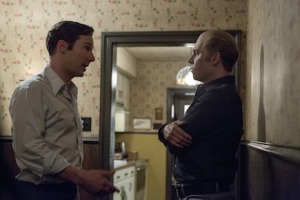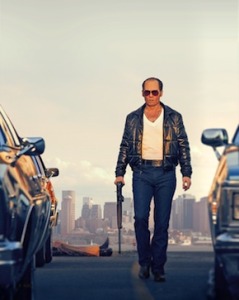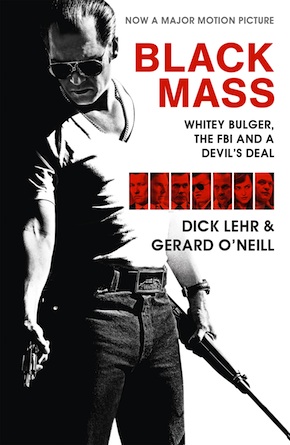One moonlit night
by Dick Lehr and Gerard O'NeillUnder a harvest moon FBI agent John Connolly eased his beat-up Plymouth into a parking space along Wollaston Beach. Behind him the water stirred, and further off, the Boston skyline sparkled. The shipbuilding city of Quincy, bordering Boston to the south, was a perfect location for the kind of meeting the agent had in mind. The roadway along the beach, Quincy Shore Drive, ran right into the Southeast Expressway. Heading north, any of the expressway’s next few exits led smack into South Boston, the neighborhood where Connolly and his ‘contact’ had both grown up.
Using these roads, the drive to and from Southie took just a few minutes. But convenience alone was not the main reason the location made a lot of sense. Most of all, neither Connolly nor the man he was scheduled to meet wanted to be spotted together in the old neighborhood. Backing the Plymouth into the space along the beach, Connolly settled in and began his wait. In the years to come Connolly and the man he was expecting would never stray too far from one another. They shared Southie, always living and working within a radius of a mile of each other in an underworld populated by investigators and gangsters.
But that came later. For now Connolly waited eagerly along Wollaston Beach, the thrum of the engine a drag to the buzz inside the car that was like an electric charge. Having won a transfer back to his hometown a year earlier, he was poised to make his mark in the Boston office of the nation’s elite law enforcement agency. He was only thirty-five years old, and this was going to be his chance. His big moment in the FBI had arrived.
It suddenly seemed like the Mafia was everywhere and everyone wanted a piece of the mysterious and somehow glamorous organization, including Hollywood.”
The nervy agent was coming of age in an FBI struggling with a rare public relations setback. In Congress, inquiries into FBI abuses had confirmed that the late FBI director J. Edgar Hoover had for years been stockpiling information on the private lives of politicians and public figures in secret files. The FBI’s main target, the Mafia, was also in the news. Swirling around were sensational disclosures involving a bizarre partnership between the CIA and the Mafia also unearthed during congressional investigations. There was talk of a CIA deal with mafiosi to assassinate Cuba’s Fidel Castro as well as murder plots that involved poisoned pens and cigars.
Indeed, it suddenly seemed like the Mafia was everywhere and everyone wanted a piece of the mysterious and somehow glamorous organization, including Hollywood. Francis Ford Coppola’s movie masterpiece, The Godfather, Part II, had played to huge audiences when it opened the year before. A few months earlier the picture had won a slew of Oscars. Connolly’s FBI was now deeply into its own highly publicized assault on La Cosa Nostra. It was the FBI’s number-one national priority, a war to counter the bad press, and Connolly had a plan, a work-in-progress to advance the cause.
Connolly surveyed the beachfront, which at this late hour was empty. Occasionally a car drove past him along Quincy Shore Drive. The bureau wanted the Mafia, and to build cases against the Mafia, agents needed intelligence. To get intelligence, agents needed insiders. In the FBI the measure of a man was his ability to cultivate informants. Connolly, now seven years on the job, knew this much was true, and he was determined to become one of the bureau’s top agents – an agent with the right touch. His plan? Cut the deal that others in the Boston office had attempted, but without success. John Connolly was going to land Whitey Bulger, the elusive, cunning, and extremely smart gangster who was already a legend in Southie. The stylish FBI arriviste wasn’t the type to take the stairs. He was an elevator man, and Whitey Bulger was the top floor.

Benedict Cumberbatch and Johnny Depp as Billy and ‘Whitey’ Bulger in Black Mass © Warner Bros
The bureau had had its eye on Bulger for some time. Previously, a veteran agent named Dennis Condon had taken a run at him. The two would meet and talk, but Whitey was wary. In May 1971 Condon managed to elicit extensive inside information from Whitey on an Irish gang war that was dominating the city’s underworld – who was allied with whom, who was targeting whom. It was a thorough, detailed account of the landscape with an accompanying line-up of key characters. Condon even opened an informant file for Whitey. But just as quickly, Whitey went cold. They met several times throughout the summer, but the talks didn’t go well. In August, reported Condon, Whitey was “still reluctant to furnish info.” By September Condon had thrown up his hands. “Contacts with captioned individual have been unproductive,” he wrote in his FBI files on September 10, 1971. “Accordingly, this matter is being closed.” Exactly why Whitey ran hot then cold was a mystery. Maybe the all-Irish nature of the intelligence he’d provided had proved discomforting. Maybe there was a question of trust: why should Whitey Bulger trust Dennis Condon of the FBI? In any event, the Whitey file was closed.
Now, in 1975, Condon was on the way out, his eye on his upcoming retirement. But he’d brought Connolly along, and the younger agent was hungry to reopen the Whitey file. After all, Connolly brought something to the table no one else could: he knew Whitey Bulger. He’d grown up in a brick tenement near the Bulgers’ in the Old Harbor housing project in South Boston. Whitey was eleven years older than Connolly, but Connolly was oozing with confidence. The old neighborhood ties gave him the juice others in the Boston office didn’t have.
Under the cover of darkness the two men began to talk, and then Connolly made his offer: ‘You should think about using your friends in law-enforcement.'”
Then, in an instant, the waiting was over. Without any warning, the passenger side door swung open, and into the Plymouth slipped Whitey Bulger. Connolly jumped, surprised by the suddenness of the entry, surprised he was caught unaware. He, a trained federal agent, had left his car doors unlocked.
“What the hell did you do, parachute in?” he asked as the gangster settled into the front seat. Connolly had been expecting his visitor to pull up in a car alongside him. Bulger explained that he had parked on one of the side streets and then walked along the beach. He’d waited until he was sure no one else was around, and then he’d come up behind from the water.
Connolly, one of the younger agents on the prestigious Organized Crime Squad, tried to calm himself. Whitey, who’d just turned forty-six on September 3, sat in the front seat, larger than life, even if he just barely hit five-feet-eight and weighed an ordinary 165 pounds. He was hard-bodied and fit, with penetrating blue eyes and that signature blond hair, swept back. Under the cover of darkness the two men began to talk, and then Connolly, properly obsequious to a neighborhood elder who was also an icon, made his offer: “You should think about using your friends in law-enforcement.”

Johnny Depp as Whitey BUlger in Black Mass © Warner Bros
This was Connolly’s pitch to Whitey: you need a friend. But why?
By the time Connolly and Bulger met, the young FBI agent had done his homework. He knew Bulger and the Winter Hill gang were facing a two-pronged threat from a local Mafia that for decades was controlled by the powerful underboss Gennaro J. Angiulo and his four brothers. Pending at that moment was a dispute between the two organizations over the placement of vending machines throughout the region. There had been wise-guy bluster about shootouts as a way to settle the matter. With all this instability, Connolly argued, a wiseguy could use a friend.
Besides, Angiulo was wily and inscrutable. He had a knack for setting up for arrest those he no longer had any use for. For example, a few years earlier a mob enforcer had veered out of his control. Angiulo, the story went, had reached out to his contacts inside the Boston Police Department, and the mob renegade was soon picked up on phony gun charges after crooked cops planted weapons in his car. No one knew for certain whether Angiulo in fact had the kind of access to manipulate an arrest like that. But this was the story making the rounds, and Whitey Bulger and the rest of Howie Winter’s gang believed it. As Connolly well knew, perception was all that actually mattered.
Bulger was clearly concerned about Angiulo setting him up. “What if three cops stop me at night and say there was a machine gun in my car?” Whitey had complained. “Who is the judge gonna believe? Me or the three cops?” Connolly had positioned himself to play off such cross-currents of underworld paranoia.
The two men sat in the Plymouth, the city lights rippling on the water. “You should use your friends,” Connolly stressed – a line that caused Bulger to consider the agent intently, sensing an opening for the upper hand.
“Who?,” Whitey asked at last. “You?”
“Yeah,” replied Connolly to a ruthless man who used up people and threw them away. “Me.”
This is an extract from Black Mass: Whitey Bulger, The FBI and a Devil’s Deal, out now in paperback and eBook from Canongate. A gripping tale of violence, double-cross and corruption, Black Mass takes us deep undercover, exposing one of the most outrageous scandals in FBI history. It’s the true story of Whitey Bulger, the brother of a state senator and the most infamous violent criminal in the history of South Boston, who became an FBI informant to take down a Mafia family invading his turf. Today we know that the deal between ‘Whitey’ Bulger and the FBI was deeper, dirtier, and more personal than anyone had imagined.
Read more.
Now a major film starring Johnny Depp, Benedict Cumberbatch, Dakota Johnson and Kevin Bacon. In UK cinemas from Wednesday 25 November.
Dick Lehr and Gerard O’Neill are former reporters with the Boston Globe, and co-authors of Whitey: The Life of America’s Most Notorious Mob Boss. O’Neill has won the Pulitzer, Hancock and Loeb Prizes. Lehr, a Pulitzer finalist, has also won the Hancock and Loeb awards. He currently is a professor of journalism at Boston University, where he is a co-director of an investigative reporting clinic.
blackmassthemovie.com
@BlackMassMovie


